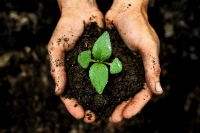
We would like to kindly remind you that you are invited to participate in an e-consultation on Combating Soil Salinization in Eurasia that will run between May 12 and June 6, 2014. Sponsored by the Eurasian Center for Food Security (ECFS) and the World Bank, the objective of this e-consultation is to generate a discussion on how best to promote sustainable management of soils subject to salinization in the Eurasian region (Russia, Central Asia and the Caucasus). The discussion also aims to identify research gaps and strategies to increase awareness of the issue of soil salinization and attract investments for soil reclamation and improvement. The outcome of this discussion will inform the current and future work program of the ECFS, and will also contribute to the activities of the Eurasian Soil Partnership. The findings of the consultation will be published as an ECFS paper.
In 2011, as part of its contributions to improve global food security, the Russian Federation established the ECFS under the Lomonosov Moscow State University (MSU). The ECFS is intended to become a center of excellence on agricultural research and an important member of the global network of agricultural expertise, catalyzing agricultural development in the Eurasian Region and contributing to solving food security issues in Eurasia and globally. The ECFS is currently the Secretariat of the sub-regional Eurasian Soil Partnership (EASP) which was established in November 2013 under the framework of the Global Soil Partnership supported by the Food and Agriculture Organization of the United Nations (FAO).
The following topics were proposed for discussion:
Topic 1: How should soil management be improved to reduce soil salinization? What approaches and methods should be recommended for their efficiency, cost, and technical simplicity?
Topic 2: What is the best way to increase public awareness and knowledge on issues of soil salinization and improved soil management? What is needed to improve the knowledge and skills of agricultural extension workers to better manage soil health? What is needed in order to attract investments for soil reclamation and improvement?
Topic 3: What are the gaps in scientific knowledge that need to be closed in order to improve the management of potentially saline lands?
Topic 4: How should soil salinity be monitored by remote sensing and field methods? Is there a need for creating a dynamic database on soil salinity?
Topic 5: Do we need harmonized methods for quantifying soil salinity (concentration, electric conductivity, grades of salinity etc. in different systems)? Regional vs. global harmonization of data: what should be done with legacy data on saline soils?
Also, you can submit feedback on other topics related to soil salinity not covered by the above-mentioned topics.
In order to join the discussion, please register at https://collaboration.worldbank.org. Upon registering, please click on https://collaboration.worldbank.org/groups/russia-ecfs, which will take you directly to the E-consultation site. A user guide is attached below.
If you encounter registration problems, you can refer to the summary of the e-consultation (attached below) as of May 27, 2014, and submit your input on any of the above-mentioned topics to Marketa Jonasova (mjonasova@worldbank.org) or Ekaterina Kucheriavenko (ekucheriavenko@worldbank.org).
